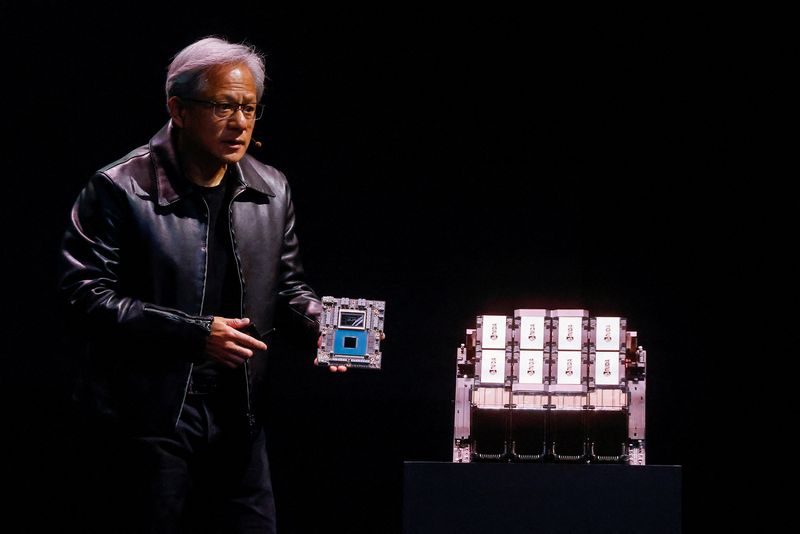Nvidia CEO Jensen Huang: Leather-jacketed boss of trillion-dollar chip firm
2023.05.30 21:00

© Reuters. FILE PHOTO: Nvidia Corp Chief Executive Jensen Huang speaks at the COMPUTEX forum in Taipei, Taiwan May 29, 2023. REUTERS/Ann Wang/File Photo
By Yuvraj Malik, Samrhitha A and Stephen Nellis
(Reuters) -When the pandemic forced Nvidia (NASDAQ:) Corp to hold a major product launch virtually, CEO Jensen Huang beamed video to promote the event from his kitchen, where he pulled the company’s latest chip out of his oven.
“I’ve got something I’ve gotta show you,” Huang says while reaching for a pot holder. “This has been cooking for a while,” he says before grunting to lift a circuit board the size of a baking sheet from the oven to show “the world’s largest graphics card.”
That’s the type of showmanship that has turned the Taiwanese-American immigrant, who typically wears a black leather motorcycle jacket for product launches, into one of the best known names in the computing business.
On Tuesday, he joined an elite list of tech executives to head a company worth $1 trillion.
Huang, 60, is only the second U.S. CEO after Amazon.com Inc (NASDAQ:)’s Jeff Bezos, who helmed the retailer until 2021, to hit such a milestone for a company they co-founded.
There are few CEOs this side of late Apple Inc (NASDAQ:) chief Steve Jobs who are so synonymous with their companies. Huang even has a tattoo inspired by Nvidia’s logo on one arm.
Nvidia chips have been at the heart of major tech tends from video games to self-driving cars, to cloud computing, and now AI – artificial intelligence.
The company’s shares have been on a tear, rising on stellar sales projections from a boom in AI. Since the launch of OpenAI’s ChatGPT on Nov. 30, 2022, Nvidia’s value has ballooned from roughly $420 billion to its current level.
Huang’s success stems in part from a desire to solve thorny computer science problems with a mix of software and hardware – a vision that has taken him three decades to perfect.
Born in Taiwan, Huang moved to the United States as a child, earning engineering degrees at Oregon State University and Stanford University.
In 1993, when he was 30, he founded Nvidia along with Curtis Priem and Chris Malachowsky, securing backing from Silicon Valley’s Sequoia Capital and others. Its first big hits were specialized chips to power high-intensity motion graphics for computer games called graphics processing units (GPUs). Even then, Huang did not think of Nvidia as just a chip company.
“Computer graphics is one of the most complex parts of computer science,” Huang told an audience in Silicon Valley in 2021 while receiving a lifetime achievement award. “You have to understand everything.”
By the mid-2000s, Huang and his team realized Nvidia’s chips could be used on more general computing problems and released a software platform called CUDA to allow software developers of all stripes to program Nvidia chips.
AN EARLY BET
That kicked off of a wave of new uses, including for cryptocurrency. But Huang recognized that university labs were using his chips for work in AI, a niche in computer science that held promise of powering everything from virtual assistants to self-driving cars. He released a parade of chips for AI, and the bet paid off.
Nvidia also differentiated itself by outsourcing its silicon manufacturing to partners including Taiwan Semiconductor Manufacturing, bucking the model set by Intel (NASDAQ:), which is now worth a fraction of Nvidia’s value – which was just under $1 trillion as of Tuesday’s close.
“He has helped enable a revolution that allows phones to answer questions out loud, farms to spray weeds but not crops, doctors to predict the properties of new drugs – with more wonders to come,” AI entrepreneur Andrew Ng wrote of Huang in Time magazine when the latter was named one of the 100 most influential people by Time in 2021.








